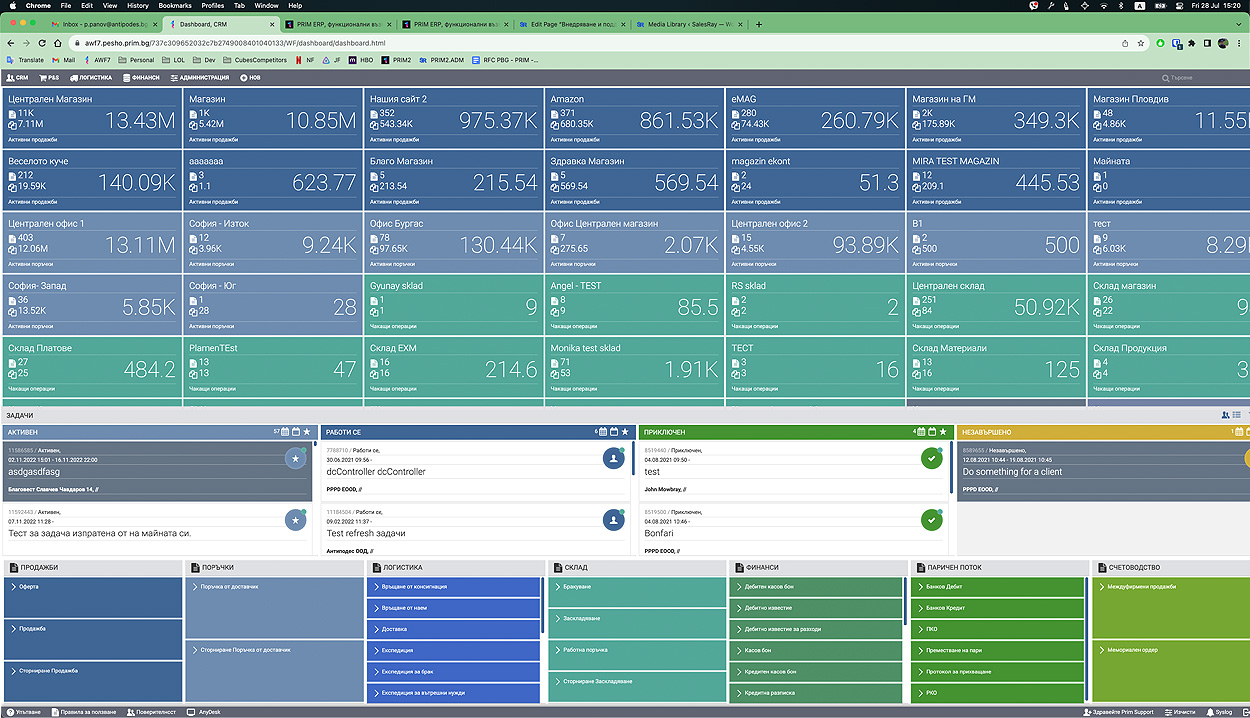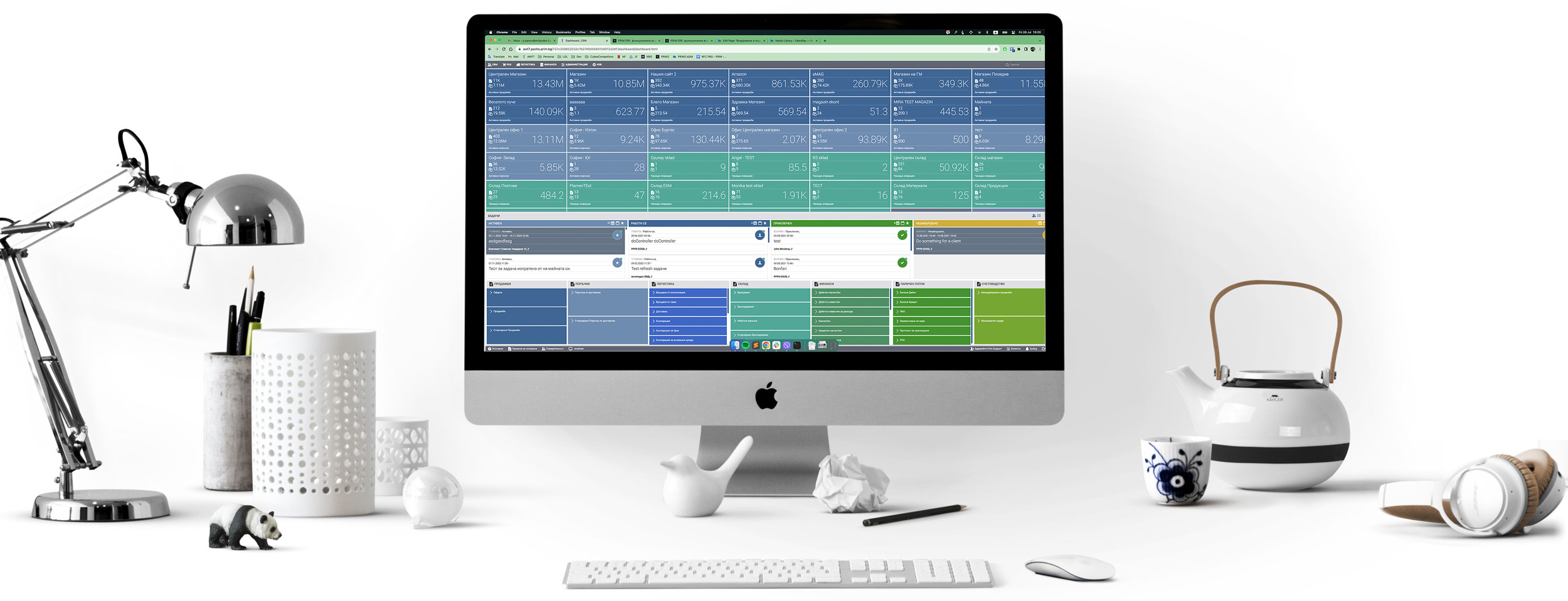CRM
Customers are the most critical asset for any business, but even high-quality customer service can deteriorate over time and when customer numbers increase. The CRM module will help you organize your customer information conveniently and easily, and make it available to everyone across the sales and management teams.
Account (contact) types and status
- Predefined account types — clients, vendors, banks, administration, holdings — with specific functionality for each type
- Client and Supplier types — define an unlimited number of client and supplier types.
- Set user permissions for the different account types — access, creation, editing, archiving.
- Account status — define an unlimited number of statuses for your accounts.
CRM Account file
- Contact information — names, phone numbers, responsibilities, etc.
- Multiple types of addresses and multiple addresses per account
- Events
- Bank accounts
- Files and documents
- Sales/Purchases history
- Invoices/Payments history
- Specific sales and pricing policies for the CRM account
- Default price list
- Default currency
- Default tax applied
- Payment terms
- Specific discounts and prices
- Credit limits based on sales/receivables
- 360-degree view of the CRM account — volume of sales/purchases, receivables/payables, advances and deposits, account balance
- Rights management to the information of the account
- Set user permissions for access to account information
- Complete log of operations for the account — who performed which action when, and which document was created, edited, archived or deleted
Tasks and events
- Predefined event types
- Planned future tasks and events
- Add invitees from contacts in the CRM
- Alert users of upcoming tasks and events:
- Attach files and documents
- Refer to documents in the system
- Assign tasks and monitor progress:
- Assign personal and group task
- Reassign tasks to other users
- Information on task statuses - when it was opened and completed
- Add comments to tasks
SALES MANAGEMENT
Sales is the energy that drives your business. The system supports multiple sales options, no matter how complex they are. The key to managing this complexity is the division between warehouse management, invoicing, and payments, which makes them independent yet associated steps in fulfilling and monitoring a sale.
Sales
- Unlimited Points of Sale — stores, websites, warehouses, salespersons, etc.
- Define an unlimited tree structure: Regions > Stores > Points of Sale (POS) — and filter information by each level
- Retail sales:
- Automatic Dispatch Orders/Store Outs
- Support for Cash bills and Invoices
- Support for cash/card payments
- Invoicing multiple cash bills
- Retail sales with delivery:
- Order processing
- Automatic generation of Bill of Ladings
- Delivery routes
- Wholesale sales:
- Multiple invoices per sale - advance and final
- Third-party invoicing
- Multiple payments - cash, bank transfers, card payments, cash on delivery, payment by deposit
- Multiple Dispatch Orders/Store Outs from one or more warehouses
- Reserve quantities in warehouses for sales
- Automatic Purchase orders for Sales Orders
- Support for multiple taxes
- Line discounts and document discounts
- Price and quantity reversal
- Products replacement
- Discounts on volumes
- Track expenses per sale
Pricing policies
- Multiple models of pricing policies
- Price lists
- Price lists by type of client
- Price lists by client
- Retail price lists
- Wholesales price lists
- Support for minimum prices
- Comprehensive user permissions for access to the specific price lists
- Consecutive searching for a price from the most specific to the most generic set price
- Promotions:
- Pricing policies
- Group pricing policies, and define those that exclude promotions and those that can be combined.
- Define start and end dates for pricing policies
- Bonus points — define different rules for earning and spending bonus points
- Comprehensive user permissions for setting specific prices in sales orders
- Comprehensive user permissions for giving line and document discounts
- Set pricing policies by:
- Specific or multiple clients
- Client type
- Client status
- Specific or multiple products/services
- Group of products/services
- Point of Sale
- Specific one or multiple salespersons
- Brand
- Supplier
Sales Order file
- User permissions restrict access to certain information about a Sales Order
- Related transactions — store operations, financial documents and payments
- Additional Expenses related to the SO
- Attached documents
- History of operations
Integrations
- Integration with e-commerce systems — Magento, WooCommerce, OpenCart, CloudCart, etc.
- Integration with marketplaces — Amazon, eBay, eMag, Vivre, etc.
- Integration with shipping operators — automatic retrieval of Bill of Lading, automatic debit of virtual accounts for cash on delivery orders
- Use of barcode scanners
- Integration with fiscal printers and other specialized printers
Sales Reports
- Sales:
- Number of sales
- Quantity of goods/services sold
- Volume of sales
- Invoiced
- Fullfilled
- Filtered on / Grouped by:
- Clients
- Specific goods/service or groups of goods/services
- Brands
- Sales location - by region, store, Point of Sale
- Salesperson - by account manger or salesperson
- Unique sales prices
- ABC analysis:
- By goods/services
- By client
- Average sales price by goods/services - minimum, maximum, standard deviation.
Targets
- Define targets for:
- Single or multiple clients
- Single or multiple goods/service
- Client types
- Group of goods/services
- Slaes locations
- Single or multiple salesperson
- Single or multiple brands
PURCHASES MANAGEMENT
Prim.io ensures accurate monitoring of a company’s purchasing process. The module is fully integrated with the rest of the system, allowing accurate inventory management and preventing unnecessary waste of resources.
Supplier settings
- Supplier price lists
- Supplier SKUs for materials and goods - assign a Supplier, Supplier SKU and Supplier item name in the nomenclature of each item
- Settings for:
- Individual price list
- Default currency
- Credit limit
- Payment terms
- Default tax applied
Purchase orders and deliveries
- Multiple deliveries per purchase order to one or many warehouses
- Multiple invoices per purchase order — advance and final
- Direct Store Ins per purchase order (omitting the delivery step)
- Support for work with lots, expiry dates, serial numbers, etc.
- Multiple payments per invoice — cash, bank payment, payment by deposit
- Automatic generation of purchase orders for one or many sales orders
- Support for different taxes
- Line and document discounts as a percentage or an absolute sum
- Price and quantity reversals
- Discounts on purchase orders — automatic calculation of discounts on multiple purchase orders for a vendor
- Track expenses per purchase order
Purchase Order file
- User permissions restrict access to certain information about a purchase order
- Related transactions — store operations, financial documents and payments
- Expenses accumulated for the purchase order
- Attached files and documents
- History of operations
Purchases reports
- Purchases:
- Number of purchases
- Quantity of goods/materials
- Order volume
- Invoiced orders
- Fulfillment
- Filtered/grouped by:
- Supplier
- Goods/services
- Groups of goods/services
- Brands
- Average sales price by goods/services – minimum, maximum, standard .
INVENTORY MANAGEMENT AND LOGISTICS
Prim.io allows you to create and manage multiple offices, warehouses and sub-warehouses with separate departments or areas, and to define complex geometries or territorial divisions with numerous stores and Points of Sale.
Nomenclature management
- Support for lots.
- Support for serial numbers.
- Support for expiry dates.
- Supported nomenclature types - goods, materials, products, Bill Of Materials (BOMs).
- Multiple units of measurement per item, with formulae to convert from one to another.
- Select default and secondary units of measurement.
- Specific units of measurement for purchasing and sales.
- Brands.
- Groups of goods/services.
- Related items.
- Item characteristics - set different types of additional characteristics:
- For groups of goods/services.
- Define which characteristics are required.
- Images.
- Volumne and weight.
- Intrastat codes.
Items file
- Inventory - by warehouses and locations, by lot and serial number.
- Store operations and requests.
- Inventory by consignment and rent contract.
- Sales.
- Orders.
- Multilingual support.
- User permissions restrict access to certain information in the Item file.
Inventory
- Add an unlimited number of warehouses and sub-warehouses with sectors and locations
- Define different areas or locations in the warehouses
- Work with negative quantities
- Inventory at a certain date and compare inventories at two dates
- Detailed inventory report by warehouse and location
- Minimum safety stock and optimal quantity of stock
- Inventory of rent and consignment contracts
- Cost
- Cost based on direct and indirect expenses.
- Cost of lots.
- Automatic calculation of cost at warehouses.
- User permissions restrict access to cost information.
- Edit past warehouse operations with automatic recalculation of costs.
Logisitics and warehouses management
- Full and partial inspection.
- Revaluation of inventory.
- Store transfers.
- Delivery Orders/Store Ins.
- Dispatch Oreders/Store Outs.
- Orders for scrapping.
- Packiging Orders, Bills of Lading.
- Routes management for sales fulfilment and store transfers
Integrations
- Integration with speditors - automatic generation of bills of lading, calculation of weight and volume, monitoring of order status, automatic crediting of couriers’ virtual accounts for cash on delivery orders
- Integration with barcode scanners
- Integration with fiscal printers and other specialized printers
Warehouse and logistics reports
- Inventory turnover - starting balance, all moves In and Out, ending balance
- Goods and materials turnover
- Loading stock report
- Inventory planning
- Pending requests
МANUFACTURING
- Multiple recipies per product
- Import of recipies from XLS files
- Operations in recipies
- Cost calculation per product
Manufacturing reports
- Materials used
- Production
FINANCES AND ACCOUNTING
Make all your financial transactions in one place with a minimal chance of human error and no risk of omitting a critical operation. Real-time information on your company’s overall financial picture to help you make the right decisions on time.
Bank and cash accounts
- Create an unlimited number of bank, cash and virtual accounts
- Work with an unlimited number of currencies
- Automatic setting of exchange rates for all currencies
- Multicurrency accounts
- Import bank statements and automatic reconciliation
Financial documents
- Support for all legal requirements
- Define an unlimited number of financial documents
- Multiple invoices per sales order
- Invoicing in a different currency than the sales order
- Invoicing for multiple cash bills
- Define protocols
- Support for different templates for each document
- Multilingual support
Payments
- Multiple payments per invoice
- Payment in a different currency than the invoice
- Cash transfers, restricted by user permissions
- Payment by deposit
- Cash back
Manage access to documents and accounts
- User permissions restrict access to certain account information
- User permissions restrict access to certain documents (create, view, edit, cancel, delete)
- Full log of all operations
Financial reports
- Support for unlimited nomenclatures in revenues and expenses
- Revenue reports
- Expenditure reports
- Receivables and overdue receivables
- Payables and overdue payables
- Liquidity/cash flow
- Expected cash flow
- Statements of revenue and expenditure
- Advances
- Deposits



